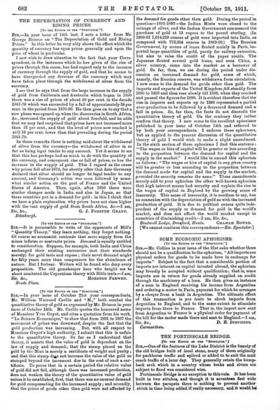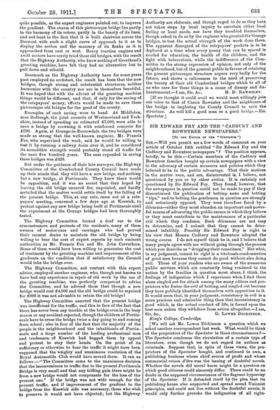THE PORTINSCALE BRIDGE.
ITO THE BMWS 07 THE ''SPECTATOIL"I
Suc,—One of the features of the Lake District is the beauty of the old bridges built of local stone, many of them originally for packhorse traffic and spliced or added to to suit the mail coach traffic of a later clay. They generally retain the hump- back arch which in a country whose becks and rivers are subject to flood was considered wise.
Portinscale Bridge is no exception to this rule. It has been built in two stitches, and though it is seventeen feet wide between the parapets there is nothing to prevent another stitch in time being added if really necessary, and it would Jai quite possible, as the expert engineers pointed out, to improve the gradient. The charm of this picturesque bridge lies partly in the harmony of its colour, partly in the beauty of its lines, and not least to the fact that it is built slantwise across the Derwent with such a slight curve of approach to it as to display the arches and the masonry of its flanks as it is approached from east or west. Heavy traction engines and swift motors have sorely tried these old bridges, with the result that the Highway Authority, who knew nothing of Greathead's grouting machine, have felt they had no alternative but to pull down and rebuild.
Inasmuch as the Highway Authority have for some years past employed no architect, the result has been that the new bridges, though strong and substantial structures, neither harmonize with the country nor are in themselves beautiful. It was hoped that with the advent of the grouting machine things would be different, and that, if only for the saving of the ratepayers money, efforts would be made to save these picturesque old bridges for the good of the county.
Examples of such saving were to band. At Middleton, near Sedbergh, the joint councils of Westmorland and York- shire, instead of spending an estimated £7,000, were able to save a bridge by crowning it with reinforced concrete for ti'80. A gain, at Grange-in-Borrowdale the two bridges were made so strong that the well-known engineer, Mr. Francis Fox, who supervised the work, said he would be willing to teat it by running a railway train over it, and he considered its monolithic strength would probably stand all traffic for the next five hundred years. The sum expended in saving these bridges was £420.
But under the guidance of their late surveyor, the Highway Committee of the Cumberland County Council have made up their mind's that they will have a new bridge, and nothing but a new bridge, at Portinscale. They knew there would be opposition, and it was no secret that they hoped by leaving the old bridge uncared for, unpointed, and hardly metalled that the matter would settle itself by the falling of the present bridge. This, at any rate, came out at a rate- payers' meeting, convened a few days ago at Keswick, to protest against any new bridge being built at Portinscale until the experiment at the Grange bridges had been thoroughly tested.
The Highway Committee turned a deaf ear to the remonstrances and protests of the residents, many of them owners of motor-cars and carriages who had proved their earnest desire to maintain the old bridge by being willing to bear the coat of expert reports by such eminent authorities as Mr. Francis Fox and Mr. John Carruthers. Some of them would have been willing to guarantee the cost of treatment by the grouting machine and improvement of the gradients on the condition that if satisfactory the Council would take the bridge over.
The Highway Committee, not content with this expert advice, employed another engineer, who, though not known to have had any experience in repair of old work by the use of the grouting machine, was perfectly competent to advise the Committee, and he advised them that though a new bridge would cost £4,000 and the old bridge could be repaired for £800 it was not advisable to retain the old bridge !
The Highway Committee asserted that the present bridge was insufficient for the traffic, and this in face of the fact that there has never been any trouble at the bridge even in the busy season or any accident reported, though the children of Portin- scale have to cross the bridge twice a day going to and coming from school; also in face of the fact that the majority of the people in the neighbourhood and the inhabitants of Portal- scale and a large number of the leading professional men and tradesmen of Keswick had begged them by appeal and protest to stay their hands. On the point of its sufficiency or otherwise to bear the traffic it might have been supposed that the weighty and unanimous resolution of the Royal Automobile Club would have moved them. It ran as follows :—" The Committee came to the unanimous decision that the inconvenience to traffic due to the present Portinscale Bridge is very small and that any trifling gain there might be from a new bridge would not compensate for the loss of the present one." If the bridge was not wide enough for the present traffic, and if improvement of the gradient to the bridge from the Keswick side was necessary, those who wish to preserve it would not have objected; but the Highway Authority are obdurate, and though urged to do so they have not taken steps by local inquiry to ascertain either local feeling or local needs, nor have they troubled themselves, though asked to do so by the engineer who grouted the Grange bridges, to test the actual strength of the work done there. The apparent disregard of the ratepayers' pockets is to be deplored at a time when every penny that can be spared is needed for education, the health of the children, and the fight with tuberculosis, while the indifference of the Com- mittee to the strong expression of opinion, not only of the neighbourhood, but of the general public in favour of retaining the present picturesque structure argues very badly for the future, and shows a callousness to the need of preserving the beauty of their old Cumberland bridges which to all of us who care for these things is a cause of dismay and dis- [If we thought it could avail we would most willingly join our voice to that of Canon Rawnsley and the neighbours of the bridge in imploring the County Council to save the structure. As well kill a good man as a good bridge.—ED. Spectator.]











































 Previous page
Previous page